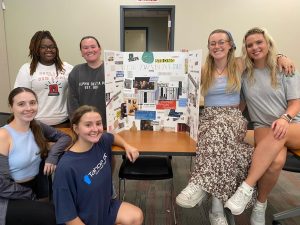“Reclaim the red zone” is a six-week social media campaign put on by Rebels Against Sexual Assault. The “red zone” is a term used to refer to the first six weeks of the school year in which a disproportionate number of sexual assaults take place on campus. According to Inside Higher Ed, more than 50% of all college sexual assaults take place during the “red zone.”

Ella Seddon, a sophomore psychology major, believes that RASA is a good resource.
“Rape is a huge issue on college campuses. I think that RASA is an awesome group to have on campus because it gives victims a place to go to seek help and support,” Seddon said. “They also raise awareness for an issue that gets swept under the rug a lot.”
RASA will host a six-week tabling event on Business Row each Wednesday 10 a.m. – 1 p.m., with events including Survivor Support, Red Zone Facts, Self-Care and Being an Active Bystander.
Executive members in RASA plan to further expand their reach by getting involved with the Office of Fraternity and Sorority Life and giving presentations to higher education classes.
Members make it their goal to provide a safe space for victims of sexual assault to have a confidential conversation with no judgment. Christin Dobbs, program manager for violence prevention and confidential advocate, works alongside Shelli Poole, assistant director for violence intervention/prevention, to provide an option for students other than making a formal report.
RASA furthers its efforts by educating students on what consent truly is. The Rape Abuse and Incest National Network (RAINN) states “Consent is an agreement between participants to engage in sexual activity. Consent should be clearly and freely communicated. Consent cannot be given by individuals who are underage, intoxicated or incapacitated by drugs or alcohol, or asleep or unconscious.”
“Consent requires enthusiasm on both sides, so instead (of ‘no means no’), I like to say ‘yes means yes,’” Olivia Dolen, a senior elementary education major, said.
















